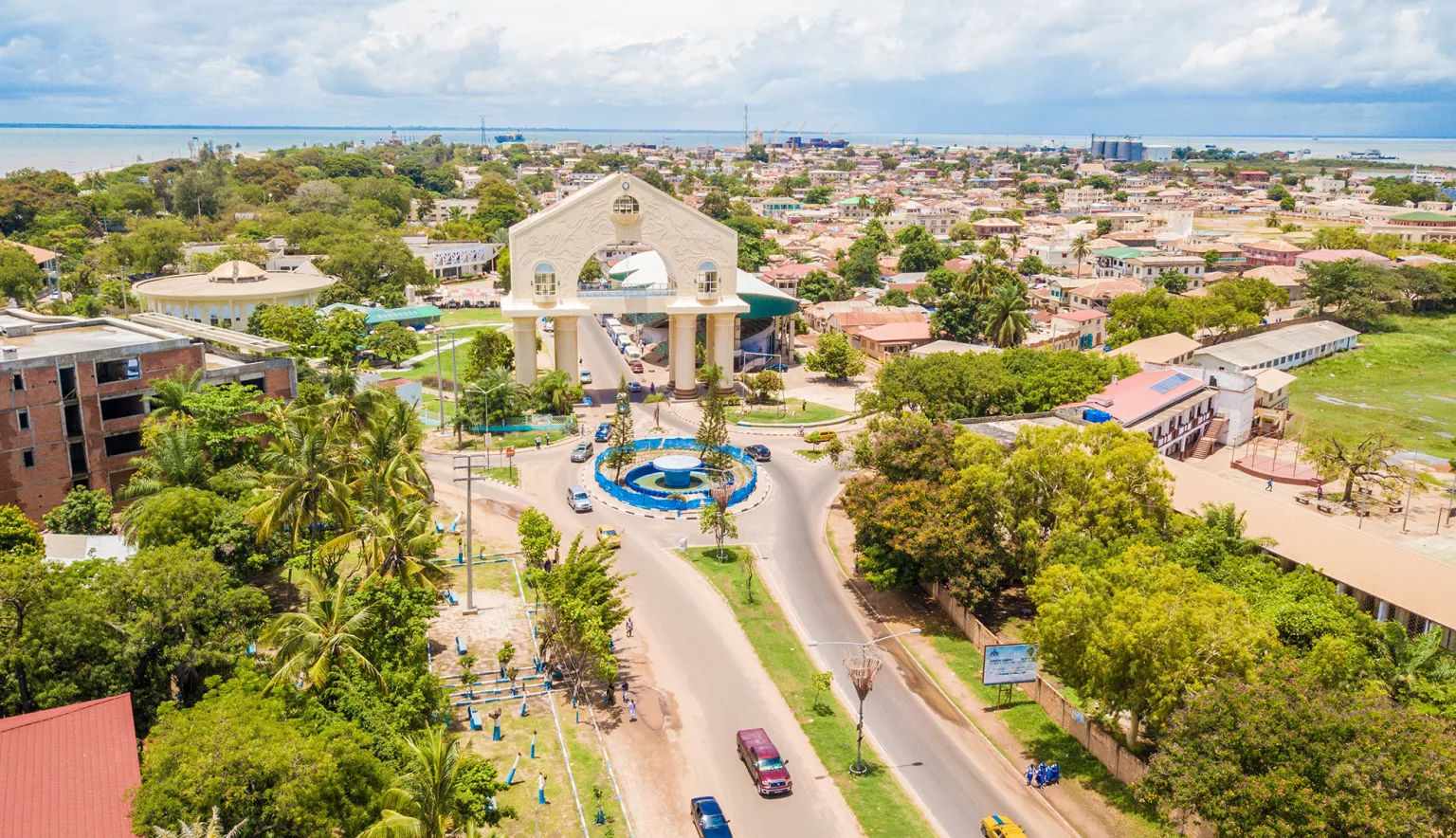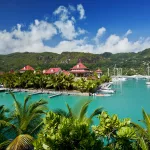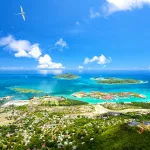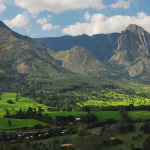From golden sands and palm trees on tropical beaches to more than 500 species of bird, The Gambia is proof that good things come in small packages.
THE GAMBIA
While The Gambia might be known as the smallest nation on the African mainland, it has equally developed a reputation as one of the continent’s most tourist-friendly countries. An obvious draw is its promise of warm weather, yet The Gambia is so much more. Home to everything from quiet tropical beaches and colonial architecture to an abundance of flora and fauna that is perfect for wildlife enthusiasts, it’s nothing less than a hidden gem along the West African shoreline.
The landscape is largely comprised of forests and marshland that surround the River Gambia, a 1,120-kilometre-long waterway that runs through the heart of the country and into Senegal and Guinea. Further, the City of Banjul, formerly known as Bathurst, is the country’s northern capital and the most densely populated metropolitan area. However, it must be noted that it is only the country’s fourth largest city. With Brikama to the west and Bakau to the south and a thriving traditional, cultural and ecotourism scene spanning across the eastern reaches of the country, there is something for everyone when it comes to exploring The Gambia.
THE BUSINESS END
Cocooned by Senegal, The Gambia’s economic epicentre can be found on its western seafront, the country home to a 60-kilometre stretch of Atlantic coastline. As such, re-export trade constitutes a large part of the nation’s economic activity, while rain-dependent agricultural activities are also a significant contributor and employ approximately 75 percent of the country’s entire labour force. In more recent times, however, tourism has equally come to account for increasingly large proportions of GDP, owed to the three strands it is able to provide: traditional sun seeking holidays, culture trips and nature-centric excursions.
In fact, the number of international arrivals rose to 225,000 last year, surpassing the 171,000 tourism-related visitors recorded in 2017, helping to set the World Bank’s latest forecast that expects the country’s economy to grow by 5.4 percent this year and maintain similar growth through 2020. This in mind, while economic development is still required, both in the way of diversification and infrastructure developments if the country is to make real progress, there has certainly been an air of optimism surrounding the country in recent times.
TOURISM INSIGHTS: THE GAMBIA HOTEL ASSOCIATION
One organisation that has been paramount to the furthering of Gambia’s tourism ambitions is the Gambia Hotel Association (GHA). Initially set up in 1973 with a modest membership of just three hotels, the organisation has expanded rapidly to encompass over 40 hotels today, comprised of two-star to five-star hotels. Speaking with Bunama Njie, the association’s current General Manager, we discussed the forecast for the country’s tourism industry, looking at some of the most exciting prospects that are set to transform both the MICE scene and the wider leisure segment.
Can you firstly talk me through the origins of the Gambia Hotel Association, how it came about, and its initial vision?
Bunama Njie (BN): Since its inception in the 70s, the core function of the GHA has been to serve as an advocacy body for its members, facilitate networking and collaborate with the tourism sector and other tourism stakeholders including the Ministry of Tourism and culture and other various agencies. Given the exceptional growth of tourism, the role and functions of the GHA include influencing policy in critical areas of hospitality development; proactive marketing and promotion of members products through joint marketing with other stakeholders such as the Gambia Tourism Board; capacity building programmes for members to keep abreast of new trends and encourage high standards of service delivery; and enhance partnership and networking amongst the growing membership and other organisations, share best practices, experiences and more.
How would you say Gambia has developed in recent years as a business travel hub and what are the key reasons behind its growing appeal?
(BN): Owed to a change in government in 2017, we have rejoined the Commonwealth and cemented our dented relations with the EU where roughly 60 percent of our tourists come from. We’ve also enhanced relations from other international communities such as the UK and USA, while tireless marketing efforts from the Ministry of Tourism and Culture, the Gambia Tourism Board, the Gambia Hotels Association, the travel and Tourism of the Gambia and the Association of Small Scale enterprise in responsible Tourism has paid dividends.
Why, in your opinion, should someone visit Gambia?
(BN): When it comes to choosing the best destination to enjoy your leisure in Africa, Gambia tops the list in terms of memorable places to enjoy and get the best African experience. You won’t experience any jet lag from the six-hour flight to most destinations that often feature gorgeous long sandy beaches, glorious winter sun and the vibrant, exotic culture and legendry hospitality of the local people. This is not to mention the abundance of exquisite and trendy resorts, the related complimentary facilities and a great ecosystem epitomised by the majestic Gambia River. Alongside this, you can expect the best local and international cuisines and different daily activities such as river cruising, fishing events, adventure and village tours, cultural orientation, and sporting activities.
Are there any specific attractions, landmarks or places to eat and drink that you would recommend?
(BN): There are many restaurants to eat from but topping all the clusters is the Senegambia Strip where there are more than 20 restaurants. I would specifically recommend the Senegambia Beach Hotel Domorr Dula international restaurant and African Buffet daily, Reo’s, Three Chicks, Al Rauche Lebanese restaurant, Scala restaurant, El Sol, Gustov Italian restaurant, African Queen International and African, Darboes Gambian Dishes, Tao Asian and many more!
What are the best ways of getting around the country?
(BN): There are organised and tailored tours offered by the Tourism and Travel Association (TTAG) of the Gambia, or organised tourist guides if you’re looking for a more personal and local touch. Alternatively, you can hop in a taxi and explore what Gambia has to offer, such as Makasutu Cultural Forest, Renowned ROOTS, Kunta Kinteh Island, wildlife and bird watching.
How do you see Gambia developing as a business travel hub over the next year to two years?
(BN): The Gambia is fast developing as a business hub, as we are now very much focused on the MICE business. More conference facilities are being built, three new hotels have been opened this year alone with over a capacity of 500 new beds, and another five new hotels are under construction, expected to be operational in 2020/2021 and provide an additional 1,000 beds.
Are there any plans or projects in the pipeline that you wish to highlight?
(BN): Gambia will host the 2021 Organisation of Islamic Cooperation (OIC) conference, and currently a new international conference centre is being built in the famous Senegambia Area in readiness for the forthcoming event. Further, there is also a new 400-room hotel, VIP lounge at the Banjul International Airport, a 22-kilometre express way and a 50-kilometre feeder road under construction. We’re also investing in a water and electricity supply project, estimated to cost $222.5 million.
Are you optimistic about the future of the tourism industry in Gambia?
(BN): We’re very optimistic. The Gambia is one of the most sought-after tourism destinations in the sub-region, as are its exquisite hotels and resorts that overshadow the popularity of others in this part of Africa. Similarly, there is a rapid increase in investments to renovate and construct ultra-morden hotels and resorts across the country, something that will serve to further this reputation.
OUTLOOK RECOMMENDS
STAY:
Kololi Beach Club Limited is a prestigious resort for the discerning holiday maker and holiday homeowner, ideal for those who prefer guaranteed luxury when staying away from home. Set within 24 acres of lush gardens and situated along a stunning beach front location, Kololi Beach is perfect for relaxation in stunning, natural surroundings.
DO:
NATURE:
MUSEUMS:
OUT AND ABOUT
When travelling around Gambia’s coastal regions, typical beach-related activities such relaxation and water sports are expectantly popular. Home to a coastline that is rarely overcrowded and features golden sands, numerous palm trees and reliable weather forecasts, it’s no surprise that the country has been described as a beach lover’s paradise. Some of the most highly recommended locations include Kotu Beach, Brufut and Kololi, each providing idyllic, serene settings. Meanwhile, national parks and nature reserves are a particular highlight as you head further inland, showcasing the 500-plus species of bird that inhabit the country, alongside monkeys, crocodiles, hippos and a number of other exotic animals. Intrepid travellers often work their way along the River Gambia, partaking in a number of excursions, while budding birders generally head for the Bao Bolon Wetland Reserve.
When considering local cuisine, street food is often unbeatable and readily provides a cheap and often cheerful authentic experience. Must try dishes include chicken yassa, m’bahal rice and a number of afra dishes that place a local twist on barbecuing. It must be noted, however, that vegetarians and vegans may struggle to get by with local cooking.
GETTING THERE AND AROUND
Banjul International Airport, also known as Yundum International, is the country’s only international airport. Located approximately 15 kilometres south from the northern coast, a short taxi or bus journey is required to get to the city centre, costing around D300-400, or roughly $8. Domestic flights aren’t an option within Gambia itself, so a combination of taxis, buses and/or car hire are recommended for getting around. The country’s Gambia Transport Service Company (GTSC) bus service, inaugurated in 2013, continues to launch new routes and expand its reach and has transformed the country’s public transport network.
Navigating The Gambia does pose some challenges, however, owed to poorly maintained roads, a lack of streetlamps and more. The country has 4,000 kilometres of road, but just 750 kilometres of these are paved, for example.This in mind, four-wheel drive vehicles are generally recommended where possible. Otherwise, for short distances, bicycles can be the best way of getting around. These are often available to hire at hotels and resorts and can be a cheap and convenient way of exploring on a day-to-day basis.






























